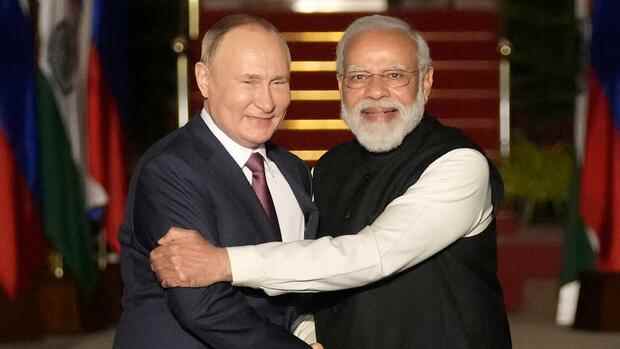Bangkok The consequences of the Ukraine crisis reach far beyond Europe: In Asia, the escalation in the Donbass threatens to drive a wedge between the western states and one of their most important partners. India has vehemently refused to condemn the actions of Russian President Vladimir Putin.
The country is thus presenting the West’s Indo-Pacific strategy with a major endurance test. Both the EU and the US must ask themselves whether the government in New Delhi can really be trusted.
The serious differences of opinion between the West and India, which the Europeans and Americans recently saw as a key comrade-in-arms in Asia, became obvious at the special session of the UN Security Council: the representative of the Indian Foreign Ministry only expressed his concern about the “tensions on the Russian-Ukrainian limit”. He did not mention Russia’s decision to send troops to the Donetsk and Luhansk regions controlled by separatists. He has also not heard a call for Ukraine’s territorial integrity.
India thus clearly set itself apart from other western allies in the Indo-Pacific region. Both Japan and Australia accused Russia of illegally violating Ukraine’s sovereignty. They announced a tough response to Russia’s recognition of Donetsk and Luhansk as independent states.
Top jobs of the day
Find the best jobs now and
be notified by email.
Together with the USA and India, Japan and Australia form the security policy-oriented association Quad. Under its umbrella, the four members want to form a counterpoint to China’s growing influence.
India maintains close relations with Russia
The fact that India is now breaking away from the group of supposedly like-minded people is noticeable in the USA. “India is the only quad participant that condones Russian misconduct,” comments Derek J. Grossman, Indo-Pacific expert at US think tank Rand Corporation. “It doesn’t paint a good picture,” he adds.
India’s rejection of a joint approach with the West in the Ukraine crisis is the result of a decades-old foreign policy doctrine, according to which the country tries to stay out of international conflicts – and a traditionally close relationship with Russia.
At the beginning of December, Kremlin chief Putin visited his Indian counterpart Narendra Modi in New Delhi and emphasized: “We regard India as a great power, a friendly nation and a trusted friend.” The latter replied that the friendship between India and Russia has always been there, despite fundamental geopolitical changes remained a constant. While the Russian troop deployment on the Ukrainian border had long since begun, the two countries reaffirmed their “particularly privileged strategic partnership”.
This is how the Handelsblatt reports on the developments in the Ukraine crisis:
The Russian-Indian partnership in armaments deals is particularly concrete. Well over half of Indian military equipment comes from Russia. Since 1991, Russian arms companies have shipped $70 billion worth of weapons to the subcontinent. Last year, Russia began delivering Russia’s S-400 missile defense system, on which India is spending $5.4 billion.
India is a major customer for the missile defense system.
(Photo: dpa)
The arms deal concluded in 2018 caused great irritation in the United States. Both the government of former President Donald Trump and his successor Joe Biden have announced sanctions against India because of the deal.
The United States had previously imposed punitive measures on Turkey for buying the same missile defense system.
A difficult dilemma to resolve
In the case of India, however, the Americans have not yet carried out their threats. In doing so, the government in Washington signaled how important it is to good relations with India in view of the common rivalry with China. Should the conflict over Ukraine escalate further, the pressure on India to decide between the two partners Russia and America is likely to increase.
Manjari Chatterjee Miller, who teaches international relations at Boston University, sees the country facing a difficult dilemma: “If it criticizes Moscow, India will alienate an important historical friend and push Russia closer to China,” she says. On the other hand, if New Delhi supports the government in Moscow, the country will “damage its relationship with the United States, a newer but extremely valuable strategic partner.” Not speaking out at all is also not a good option as it risks angering both sides and being seen as an unreliable partner.
>> Read here: The end of the heating season is approaching, and Putin’s threat potential with gas is dwindling
Sushant Sareen, economist at the Indian think tank Observer Research Foundation, also believes that difficult decisions are inevitable: “Sooner or later we will have to move in one direction or the other and live with the consequences.” India has a lot in common with the West. However, he wonders whether the western states are actually reliable.
One of the reasons why India does not readily want to support the foreign policy of the EU and the USA is the Indian perception that it is often left alone with its own problems in the neighborhood – for example with a view to the disputes with Pakistan. But the government in New Delhi would also have liked more support during the deadly clashes in the border conflict with China in 2020, says Tanvi Madan, India expert at the Brookings think tank. “Not much was heard from the Europeans at the time – because of their own dependence on China.”
In contrast to the Ukraine conflict, the Indian government is pursuing a clear position in the ongoing dispute with China over the border in the Himalayas, which Foreign Minister Subrahmanyam Jaishankar reiterated during a visit to Paris this week: “We are absolutely clear that we will not agree to any change in the status quo will.”
More: Between support and restraint – China’s difficult role in the Ukraine conflict
